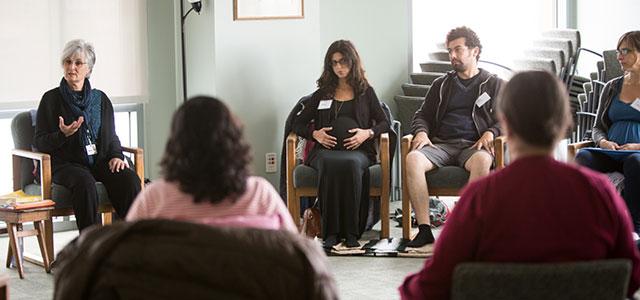
Nancy Bardacke leads a mindfulness-based childbirth class (photos by Elisabeth Fall).
Spreading the Well-Being of a Mindful Childbirth
Devoted to making childbirth less scary and more joyful, nurse-midwife Nancy Bardacke keeps circling back to UC San Francisco School of Nursing.
A 1976 alumna of the school’s nursing program and a 1981 graduate of the nurse-midwife specialty, Bardacke is the originator of Mindfulness-Based Childbirth and Parenting, a childbirth preparation program that combines daily mindfulness meditation with more traditional teaching about the physical and emotional aspects of having a baby.
Her recent book, Mindful Birthing: Training the Mind, Body, and Heart for Childbirth and Beyond, has a 5-star rating on Amazon.com and has been translated into Dutch and German, with French and Turkish editions scheduled to be published this year. It was just named the 2014 Best Book of the Year by the American College of Nurse-Midwives.
Started in her Oakland living room 16 years ago, Bardacke’s program is now taught around the world, including in quickly filled courses at UCSF’s Osher Center for Integrative Medicine.
This summer, Bardacke, 71, returns to the midwifery program at the School of Nursing to teach first-year students a new mindfulness meditation class she designed. She hopes to help students manage their own stress, as well as expose them to a childbirth preparation approach they may one day want to teach their patients, as she did.
“I feel totally excited; I couldn’t be happier,” says Bardacke, an assistant clinical professor of nursing. “People get such benefit from meditation practice. It’s so helpful, which makes me happy. It decreases suffering, which can help midwives with the stresses of their career, as well as the parents they’re helping.”
Mindfulness meditation – one of numerous ways that people meditate – is intended to help people appreciate awareness of the moment and stay present, versus worrying about the past or the future. Regular or daily mindfulness meditation is associated with decreased anxiety, stress and depression and with boosting positive emotions.
A Personal Juncture
The same year that Bardacke graduated midwifery school, she went on her first silent meditation retreat, a 10-day session that strengthened her personal commitment to daily meditation practice.
From her first job as a midwife at Mount Zion Hospital’s Alternative Birth Center (before the hospital merged with UCSF), Bardacke wondered if meditation could help pregnant women with what can be an anxious and painful experience. “I was trying to understand the relationship of mind and body, and use my mindfulness skills in my own midwifery practice. But I had no idea how to share it,” she says.
For example, she observed that when labor wasn’t progressing for some women, and she emptied the room of other people except the woman’s partner and herself, the labor would suddenly progress. “It was an experiential thing I observed clinically but couldn’t explain.”
Around this time, the well-known meditation teacher Jon Kabat-Zinn, now professor of medicine emeritus at the University of Massachusetts Medical School, was developing the Mindfulness-Based Stress Reduction course (MBSR), which grew to become a popular method of helping people cope with stress, pain, illness and other challenging life events.
His approach to helping patients made a lot of sense for pregnant women and their partners, Bardacke says. “At a training retreat with Jon in 1994, it all came together,” she says. “It brought together these two streams, passions that have been so helpful and meaningful in my own life, meditation practice and midwifery.”
Slow Start
 Bardacke began studying with Kabat-Zinn, whose stress reduction course was slowly but steadily entering mainstream medicine, fueled by the demand of physicians, nurses and other providers. “Health care practitioners like myself wanted to share meditation practice with the people we were caring for who wanted to learn how to do it,” Bardacke says.
Bardacke began studying with Kabat-Zinn, whose stress reduction course was slowly but steadily entering mainstream medicine, fueled by the demand of physicians, nurses and other providers. “Health care practitioners like myself wanted to share meditation practice with the people we were caring for who wanted to learn how to do it,” Bardacke says.
She adapted the approach to the birth experience, with Kabat-Zinn’s blessing. “The intent of the Mindfulness-Based Childbirth and Parenting program is to teach life skills for decreased stress in pregnancy, for working with pain and fear in childbirth and before, and to provide parenting skills from the get-go,” Bardacke explains. “It’s a way of dealing with unknowns.”
Her overall goal, she says, was to introduce the approach to hospitals or birthing centers to reach the most people. But, she says, “It was extremely difficult to get it going because it was so far out of the traditional childbirth preparation box. I tried to bring it into several institutions without much success, so I decided to start teaching it in the living room of my Oakland home.”
She taught from her living room for seven years. Individual couples. Small classes. Workshops. She started teaching other midwives, doulas and labor and delivery nurses.
From Living Room to UCSF
In 2007, UCSF’s Osher Center for Integrative Medicine invited Bardacke to launch her childbirth classes there. She was thrilled.
Today, the Osher center offers four 9-week Mindfulness-Based Childbirth and Parenting classes a year, with 12 to 14 couples in each session, as well as four weekend workshops. “When I started, I had one or two couples. Now we often have a waiting list,” Bardacke says.
Recently, Bardacke passed the baton to two teachers she had trained: Barb Boehler, a nurse-midwife, and Judy Cuneo, an obstetrician.
The 9-week Osher course is the model for classes taught internationally, says Bardacke, who can barely keep up with the demand to train health professionals who want to use the approach with pregnant women. She is currently developing a formal teacher-training program, which includes an online component.
The main 9-week course comprises:
- Practicing several forms of meditation, including breath awareness, body scan, sitting and walking
- Accessing deep physical and mental relaxation
- Learning to engage the mind to work with pain and fear during labor
- Understanding the physiology of childbirth and breastfeeding
- Practicing prenatal yoga for strength and flexibility
- Increasing confidence and courage for labor and delivery
- Enhancing communication with your partner
- Developing skills for managing stress in pregnancy, parenting and daily life
- Learning about the social and emotional needs of infants
“Pregnancy is stressful because there is so much unknown.… And there is physical pain in childbirth. It’s normal to worry about the health and well-being of oneself and one’s unborn baby,” Bardacke says. “Mindfulness skills help with all of this.”
It’s important to clarify, she says, that practicing mindfulness meditation doesn’t take the pain of childbirth away. “That is neither the intention nor the goal. Rather, it teaches skills to work with the pain.”
The pain during childbirth comes in waves, with breaks between contractions. “If one has trained the mind to be in the present moment rather than worrying about the pain that has passed or the pain in the future, women seem to find that labor is more manageable,” Bardacke says.

The Science
Research on the health benefits of mindfulness meditation is surging, as evidence builds that it’s a noninvasive, nonpharmaceutical and low-cost way of reducing stress, depression and anxiety.
“In 2012 alone, 477 studies were published investigating its effectiveness,” Bardacke says, listing the benefits associated with daily or regular meditation: improved memory and mental and physical stamina, better and more fulfilling relationships, reduction in key indicators of chronic stress and hypertension, reduction of chronic pain and addiction, and bolstering the immune system.
“The field of mindfulness and mindfulness-based interventions is virtually exploding these days as people begin to discover the power of simply being fully present to our experience in a regular and consistent way,” says Steven Hickman, a clinical psychologist and director of UC San Diego’s Center for Mindfulness.
“But the work itself has been going on systematically and methodically for many years,” Hickman continues. “Nancy Bardacke’s roots in the field of teaching mindfulness as a clinical intervention are long and deep. She has brought her extensive knowledge of the birth and parenting process to the teaching of mindfulness, and this union has yielded a powerful ‘child’ of Mindfulness-Based Stress Reduction, which parents tell us has a powerful effect.”
Specific research on mindfulness-based childbirth preparation is “in its infancy,” Bardacke says, but early work shows promising results.
A recent study by UCSF School of Medicine Assistant Professor Larissa Duncan, Bardacke and others, published in the May 7, 2014, issue of The Journal of Alternative and Complementary Medicine, found that pregnant women who’d participated in a short mindfulness childbirth preparation course had greater self-efficacy, less catastrophizing or extreme worry of pain, lower use of opioid analgesics during labor and fewer depression symptoms (especially postpartum) than those in a control group.
A 2010 pilot study by Duncan and Bardacke, published in the April 2010 Journal of Child and Family Studies, found through self-reporting that participants in a mindfulness-based childbirth course experienced decreased stress, more positive emotions, decreased depression and anxiety and less reactivity after taking the course.
“This is important, because we know that reducing stress is good for the health of both mother and baby,” says Bardacke, who emphasizes that mindfulness is helpful for parenting as well as childbirth. Numerous other studies are in the works, including collaborations with colleagues at the Oxford Mindfulness Centre at Oxford University, the University of Amsterdam and The Chinese University of Hong Kong.
The heart of the childbirth preparation course is a daily meditation practice of 30 minutes a day, six days a week – and participants are expected to make this commitment.
“The benefits only come if a person practices meditation, and that can be a challenge. But having a baby and then raising her or him is a challenge, so rising to the challenge of the course is [also] very good preparation for childbirth and parenting,” Bardacke says.
This is one reason she’s so pleased to be teaching the mindfulness meditation course to nurse-midwifery students this summer. “You can only teach what you know,” she says. “The class is to help them with the stresses of being a student, the stresses of practicing midwifery – and potentially sowing seeds for future mindfulness birthing instructors.”



